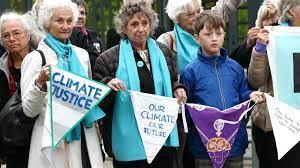
https://www.icj.org/icj-welcomes-landmark-european-court-of-human-rights...
In 2021, the ICJ and the Swiss Section of the ICJ submitted a third party intervention in the case that was brought by an association registered under Swiss law, Senior Women for Climate Protection Switzerland (Verein KlimaSeniorinnen Schweiz, the applicant association), and by four Swiss nationals, all members of that association, on 26 November 2020.
The ICJ and the Swiss Section of the ICJ provided the Court with expert observations, including on the meaning of direct and indirect victims of human rights violations, on the victim status of associations and NGOs, on the right of access to court and to an effective remedy.
In today’s judgment, the Grand Chamber refers in detail to the written observations of the ICJ and the Swiss Section of the ICJ. In particular, the judgment records the human rights organizations’ submission that “it was critical to ensure that applicants had access to courts in matters concerning climate change.” In addition, the judgment refers to the ICJ and the Swiss Section of the ICJ’s observations that “it was critical to recognise the possibility for associations to bring climate-change complaints before the Court. That was mandated by the fact that in a demanding area such as climate change (in terms of costs and scientific evidence), associations were uniquely positioned to bring such complaints to the Court.”
Failure to take positive measures to mitigate the effect of climate change on human health and well-being
In today’s judgment, the Grand Chamber held that Switzerland had violated article 8 of the ECHR, guaranteeing the right to respect for private and family life and home, the protection of which extends to human health, well-being and quality of life in the context of environmental harm and risk of harm. The Court found that Switzerland had failed to provide effective State protection “from serious adverse effects of climate change”.
According to the judgment, the State failed to comply with its positive obligations to adopt and effectively implement the necessary and relevant domestic regulatory framework to limit greenhouse gas (GHG) emissions to mitigate the existing and future effects of climate change. In particular, the Grand Chamber found that the Swiss authorities had failed to give effect to their positive obligations under the ECHR to take the necessary measures capable of mitigating the existing and potentially irreversible, future effects of climate change, such as measures capable of reducing GHG emission levels.
Failure to ensure effective access to the court
The Court also found that Switzerland had violated the right to effective access to court under Article 6 of the ECHR, guaranteeing the right to a fair trial. Among other things, it held that the domestic courts had not engaged seriously or at all with the applicant’s association complaints under domestic law regarding the effective implementation of measures to mitigate the impact of climate change. The domestic courts had failed to provide any convincing reasons as to why they had considered it unnecessary to examine the merits of the applicant’s association complaints. They had also failed to sufficiently examine the compelling scientific evidence on climate change and its inevitable future impacts on various human rights aspects.









